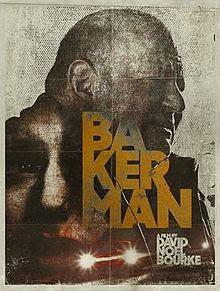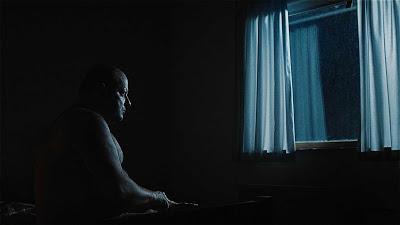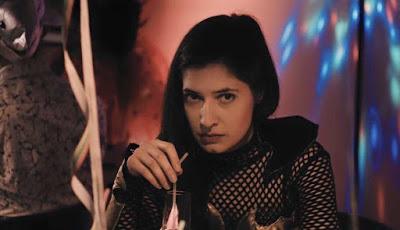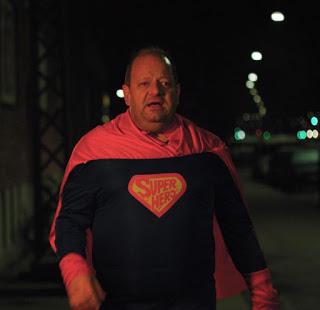 Bakerman is an
award-winning Danish film that has surprisingly not been picked up for
screening by international festivals beyond western Europe and the American
east coast. Few critics seem to have either seen the film or discussed it. Yet
it is better than some of the films that do get screened at film festivals around
the globe and get discussed. It won the Best
Foreign Film award at the Maryland International Film Festival and Best Actor
award at New York’s Nordic International Film Festival, both in USA.
Bakerman is an
award-winning Danish film that has surprisingly not been picked up for
screening by international festivals beyond western Europe and the American
east coast. Few critics seem to have either seen the film or discussed it. Yet
it is better than some of the films that do get screened at film festivals around
the globe and get discussed. It won the Best
Foreign Film award at the Maryland International Film Festival and Best Actor
award at New York’s Nordic International Film Festival, both in USA.
Director David Noel Bourke’s original script of Bakerman is quite engaging because it captures several feelings any economically fragile Dane would face in recent times. Bourke presents a variant of the very subjects that the Belgian director brothers Dardenne or even the French director Stéphane Brizé usually work on. Bourke’s script injects a sinister psychological perspective to what the Dardenne brothers or Brizé would perhaps have preferred to skip while moulding their own scripts for their films.
Bakerman’s title character is Jens (Mikkel Vadsholt), an introverted middle-aged baker by profession. It might not be the best of careers in Denmark but Jens loves his work and is concerned about retaining the quality of his baked products. It is doubly interesting when the viewer realizes that he is just an employee and not the owner of the bakery. Not many workers consider quality of the product they help produce to be important when they are not directly sharing the profits of the establishment or enjoying wide recognition for their inputs. Yet Jens is a quiet man worried about the drop in quality of the bakery’s products and chooses to voice it. The viewer begins to like Jens at this stage.

The introspective baker Jens (Mikkel Vadsholt) at home
In the film, when Jens asks his employer, an immigrant to Denmark who has acquired the bakery, for a salary raise because others in the bakery have been given one, he is rudely turned down with the argument that there are others who could replace him. One feels sorry for the good hard working Jens.
The viewer is slowly drawn closer to Jens, living alone in a house in the suburbs, waking up early before crack of dawn to have fresh baked bread and other baked products for customers in the morning. Compared to his colleague in the bakery, Jens is reticent but an observant gentle giant who referees football games.However, women friends who drink with him in the pubs do not find him sexually attractive, while his male bakery colleague is successful on that front. The viewer begins to reassess Jens.

Jens alone by the sea, reflecting and planning
A wanton act of theft and another of vandalism by immigrants from a Muslim nation involving Jens’ car parked near Jens’ workplace sparks off a Batman-like transformation in the quiet baker. He travels in his modest “Batmobile” clearing lone immigrant drug peddlers off the streets, without a mask or a cape. On one such lone night vigilante trips, he rescues a Muslim immigrant girl being brutally beaten up on an empty street by her “brother.” When Jens offers to drop the lady (Mozan) home, she explains in broken English that she has no place to stay. Our Batman takes her to his home and behaves like a gentleman towards her as Batman would.The director Bourke intentionally makes the viewer more inquisitive about Jens with his contrasting actions: one a ruthless killer and the other a genuine good guy and a gentleman.

Mozan (Siir Tilif) at the party hosted by Jens' sister
Bourke’s film grows in complexity as Jens is evidently not what he appears to be at the start of the film. The job insecurity and vandalism triggers off a set of a proactive deeds by him to set right "Jens’ world." Some of those actions reveal that quiet, boring people can be meticulous planners who can literally get away with murder.
Jens has a past not unlike that of Batman. This is revealed by newspaper clippings secretly stored away in closed boxes, which explains his moody behavior. Jens’ attitude towards religion suggests he is an atheist as he avoids attending his nephew’s confirmation, an important milestone for religious Christians. These subtexts are important in the context of the film’s ending that clarifies that Jens’ vigilante-like behavior against immigrants is not based on their religion but on their unprovoked, unacceptable actions.

Jens wearing a superhero costume for a party
appears a frail human being searching for Mozan
Bourke’s film Bakerman is interesting on several fronts. The main character Jens is revealed gradually, where the viewer is led to assess him and then reassess him continuously as the film progresses. It is a roller-coaster ride for the patient viewer right up to the end of the film to figure out the Danish Batman/Bakerman. An example of Bourke’s remarkable ability is being able to compress a murder sequence to one without any scene of the actual murder itself by creative editing of shots. More interestingly, Bakerman is a film that challenges the viewer’s judgements and luckily the dark, brooding, evil mid-section of the film gradually blends with the positive ending that Bourke provides us.

Birds in flight, an appropriate metaphor
for the happy Jens at the end
Bakerman is not a perfect film (e.g., how could a woman who cannot speak Danish figure out the headline of a Danish newspaper clipping?) Yet, its strengths are the performance of Mikkel Vadsholt who brings out the complex yet vulnerable character of Jens and the ability of Bourke to reconstruct the script into a shorter film at several stages due to budgetary constraints that an independent filmmaker faces. Both Mikkel Vadsholt and director Bourke are talented individuals and one hopes that they contribute even further to good filmmaking in the future and be more widely accepted.
P.S. Three films of the Dardenne brothers (Rosetta, The kid with the bike, and Two days, one night) and director Stéphane Brizé’s Measure of a man were reviewed earlier on this blog. (Please click on the coloured titles of the films within this post-script to access the reviews.)

